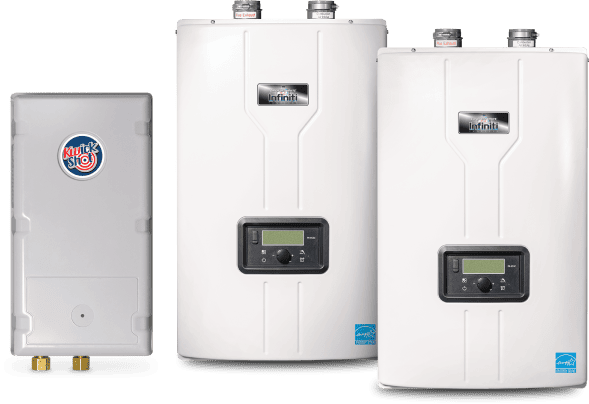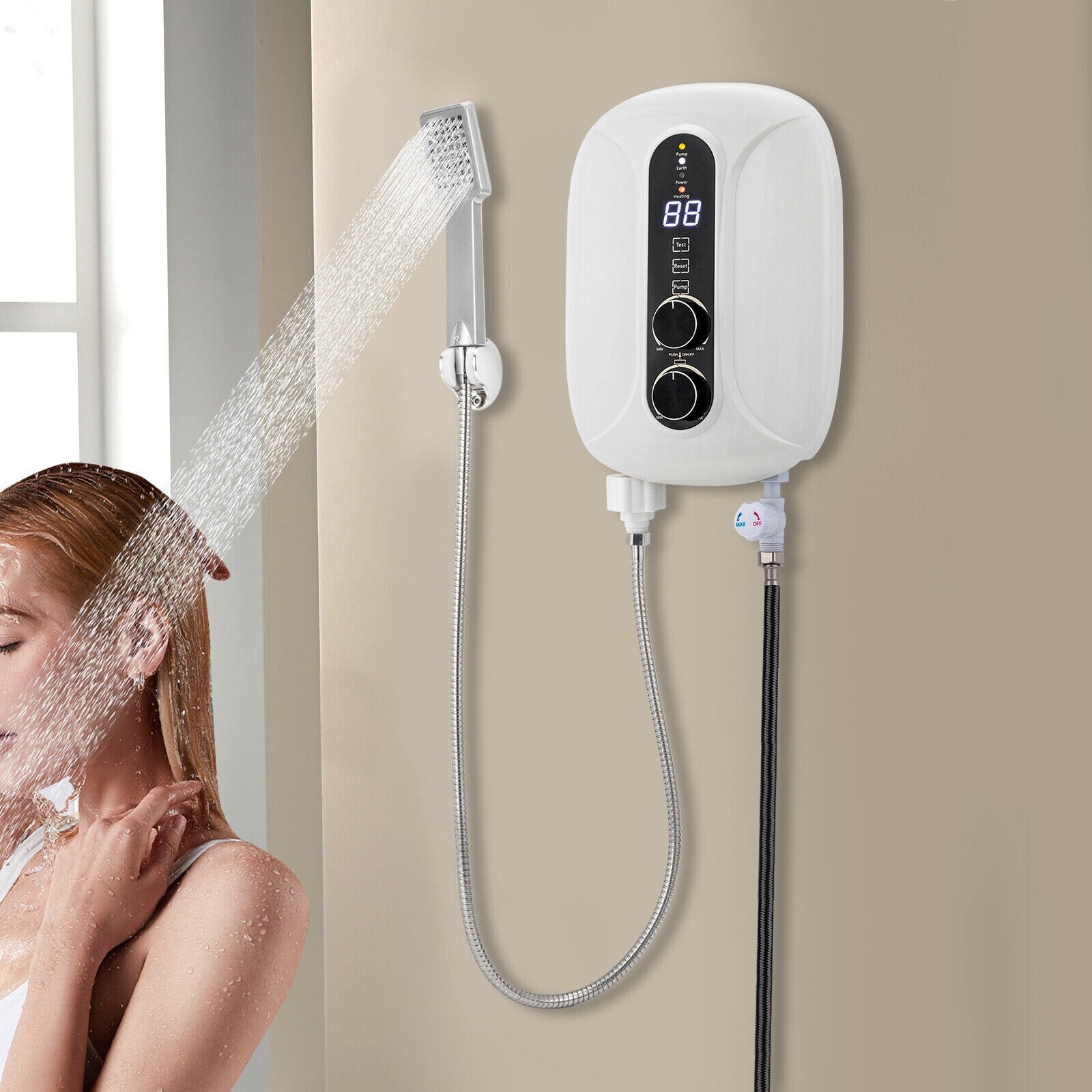Understanding The Pros Of Instant Water Heaters
Understanding The Pros Of Instant Water Heaters
Blog Article
Have you been trying to find related information concerning Why You Should Consider a Tankless Water Heater?

In a globe where ease and performance reign supreme, it's not a surprise that homeowners are frequently in search of smarter means to manage their home's power usage and convenience. One advancement that has progressively gotten popularity is the tankless hot water heater. However just what makes these systems stick out from the traditional tank-based models a lot of us matured with? Allow's dive in and check out the benefits of tankless water heaters, assisting you make a decision if it's time to make the button in your house.
Intro
Image this: you enter the shower after a lengthy day, expecting a relaxing cascade of hot water, only to be greeted by icy droplets since the last individual used all of it up. Audio familiar? Traditional hot water heater save a set quantity of hot water, implying you go to the mercy of that storage tank's supply. Tankless systems, on the other hand, heat water on demand. Say goodbye to going out mid-shower, say goodbye to fumbling with routines simply to ensure hot water is available.
Recognizing Tankless Water Heaters
What Are Tankless Hot Water Heater?
Tankless hot water heater, in some cases referred to as on-demand or instantaneous water heaters, supply warm water only as it's needed. As opposed to saving gallons of pre-heated water, these systems kick right into activity the moment you activate the tap. Water passes through a warmth exchanger, heating up in real-time, implying you obtain an undisturbed circulation of warm water without the need for a big tank sitting lazily by.
Exactly how Do They Vary from Typical Systems?
Traditional heaters hold a reservoir of hot water, utilizing power to maintain that storage tank at a consistent temperature level. Tankless devices remove the standing supply, lowering lost power and the cumbersome footprint of a large cylinder. Basically, you're upgrading from a "stockpile" way of thinking to a "made-to-order" technique.
Usual Sorts Of Tankless Units
Tankless hot water heater generally come in two varieties: gas and electric. Gas designs have a tendency to provide higher flow rates, ideal for larger houses, while electrical models commonly offer smaller homes and are typically much easier to set up. Furthermore, some systems are designed for point-of-use (offering one component) while others can take care of the entire home's warm water demands.
Key Advantages of Tankless Water Heaters
1. Endless Warm Water Supply
Ever before had to arrange showers so everyone gets their fair share of warm water? With tankless, that comes to be a thing of the past. As long as the heating system's circulation ability isn't gone beyond, you can take back-to-back showers without becoming a popsicle.
2. Energy Effectiveness and Expense Savings
Say goodbye to heating up a titan container's well worth of water and keeping it cozy throughout the day. Tankless heaters decrease standby power losses, which can lower utility expenses. While the first cost might be higher, the long-term financial savings usually justify the investment.
3. Space-Saving Style
If your home is short on storage space, removing the cumbersome container liberates beneficial room. Tankless systems are portable and can usually be placed on wall surfaces, stashed in edges, or mounted in tight utility closets without gobbling up the entire area.
4. Longer Life-span
A properly maintained tankless hot water heater can outlive its tank-based relative. Typical containers may last 10-15 years, while tankless designs can keep downing along for twenty years or even more, making them a solid financial investment with time.
5. Improved Water Quality
Saving water in a tank can often result in debris accumulation or a somewhat "off" taste. With tankless systems, fresh water is warmed on the spot, decreasing the opportunities of sediment build-up and possibly offering cleaner-tasting water.
Considerations Before Changing
Though the benefits are compelling, it's a good idea to think about a couple of variables prior to totally committing.
First Financial Investment Expenses
Tankless heating units commonly feature a greater upfront cost. Between the unit itself and possible setup modifications, the preliminary cost might provide you sticker label shock. However keep in mind to watch it as a long-term financial investment.
Setup Demands
Depending on your home's infrastructure, you might need additional electrical capacity or gas line upgrades. Ensure you understand the setup needs and seek advice from an expert to prevent shocks.
Evaluating Your Home's Water Use Patterns
If your home simultaneously utilizes numerous components with high hot water demand, ensure the device's flow price meets your requirements. Understanding your usage patterns helps you select the appropriate size and type of tankless heater.
Upkeep and Treatment Tips
Tankless systems are reasonably low upkeep, yet they aren't set-it-and-forget-it devices.
Routine Cleaning and Descaling
Tough water minerals can accumulate in the heat exchanger, impacting effectiveness. Regular descaling (typically suggested yearly) keeps the device performing at peak performance.
Yearly Expert Evaluations
A yearly checkup from a specialist makes sure minor problems are caught early. They'll analyze the unit's performance, search for leaks, and aid preserve optimal effectiveness.
Ensuring Correct Ventilation
For gas versions, correct air flow is essential to safely remove exhaust gases. See to it airing vent systems are tidy and appropriately mounted to avoid any kind of potential safety risks.
Contrasting Different Brands and Designs
Not all tankless hot water heater are created equal.
Investigating Trusted Manufacturers
Seek credible brand names with a background of generating high quality units. A dependable manufacturer usually supplies much better consumer assistance and longer guarantees.
Checking Out Reviews and Customer Comments
User evaluations and comments from next-door neighbors or pals that have actually gone tankless can provide valuable understandings. Occasionally, real-life experiences can be a lot more telling than advertising and marketing pamphlets.
Installment: DIY or Expert?
While some homeowners cherish tackling projects themselves, tankless installation may not be the very best time to burst out the tool kit.
Pros and Cons of DIY Installation
A DIY install could conserve money, but it includes risks. Incorrect installment can cause ineffectiveness or security worries. If you're handy and have experience, it might be viable-- yet proceed with caution.
When to Call a Specialist Plumbing Professional
For a lot of, calling a pro makes sure everything's done appropriately. A specialist plumbing technician understands neighborhood codes, sizing needs, and venting parameters, reducing the threat of mishaps.
Taking full advantage of Effectiveness
You've purchased a tankless unit-- currently optimize its performance.
Optimum Temperature Level Settings
Most people set their systems in between 120-140 F. Changing the temperature level can improve convenience and financial savings. Experiment to locate a pleasant place that does not squander power.
Coupling With Low-Flow Fixtures
Want to stretch your device's capacities? Take into consideration setting up low-flow showerheads and faucets. They lower water usage, enabling your tankless system to supply a stable stream of warm water without straining.
Environmental Effect
Tankless water heaters line up with greener living goals.
Lowered Carbon Footprint
By using much less energy and only heating water as required, tankless systems can lower your home's carbon impact, decreasing your ecological impact.
Preserving Natural Resources
Less power consumption and less lost hot water translate into less natural deposits being used, an environmental win-win.
Who Benefits Many from Tankless Heating units?
The elegance of tankless heating systems is that they can suit a variety of families.
Huge Family Members vs. Solitary Owners
Big households could enjoy the limitless hot water supply, while single occupants value the energy cost savings from not heating a whole container for simply a single person's early morning shower.
Property Owners with Restricted Area
If your home is short on square footage, shedding the cumbersome storage tank frees up area for other essentials-- or possibly simply a lot more elbow room.
Eco-Conscious Customers
Going tankless aligns with environmentally friendly worths, guaranteeing you're not losing energy or resources.
Future Fads in Tankless Water Heaters
The globe of home devices is ever-evolving, and tankless hot water heater are no exception.
Smart Home Combination
Imagine adjusting your hot water heater's temperature using an app or getting upkeep signals on your phone. As clever home tech developments, we'll see even more connectivity and convenience.
Innovations in Technology
R&D is constantly improving warm exchangers, making devices more reliable and durable. Future versions could be even quieter, a lot more portable, and better matched for differing environments.
Conclusion
Choosing a tankless water heater is more than simply updating your home's hot water system; it's purchasing long-lasting comfort, energy efficiency, and a greener lifestyle. By considering your home's water use, bearing in mind installation demands, and committing to normal maintenance, you can enjoy a constant stream of warm water without the baggage of a bulky tank. As technology progresses, you can anticipate even smarter, extra efficient tankless remedies that not only make your life much easier however likewise benefit the planet.
Pros and Cons of Tankless Water Heaters
Tankless Water Heater Pros
Saves Energy: Simply put, you re spending less energy to create hot water, so your total carbon footprint goes down, not to mention your bills. Lasts Longer Than Storage Tanks: Storage tank units need to be replaced every 15 years or so. But tankless units? They can last for 30 years before they give out on you. Constant Hot Water: Need to take a shower and don t want the water running cold? Awesome it won t. The water will stay hot the entire time because it creates hot water on demand. Saves You Money: Less water usage equals less money. Beyond that, you re not paying to keep water hot 24/7. Those savings add up quickly. Better for the Environment: Less water waste is better for everyone. It saves you money, but it s also environmentally conscious at the same time. Tankless Water Heater Cons
It Can Take a Minute: Depending on your specific unit and its placement, it can take anywhere from 10 seconds to 2 minutes to fully heat up. Because there s no storage tank, it heats water as you need it. Upfront Purchase Price: While we talked about their longevity, there s sticker shock when you look at brand-new tankless units to install. It pays for itself, but it s still a big chunk of change at first. Has its Limits: If you run multiple appliances at once, such as the dishwasher, washing machine, and maybe you take a shower at the same time, there might not be enough hot water. https://www.airsouthnow.com/blog/water-heater-service/pros-and-cons-of-tankless-water-heaters/

I ran across that page about Why You Should Consider a Tankless Water Heater when browsing the search engines. Are you aware of somebody else who is fascinated with the niche? Please feel free to promote it. Kudos for your time. Return soon.
Schedule An Appointment Report this page